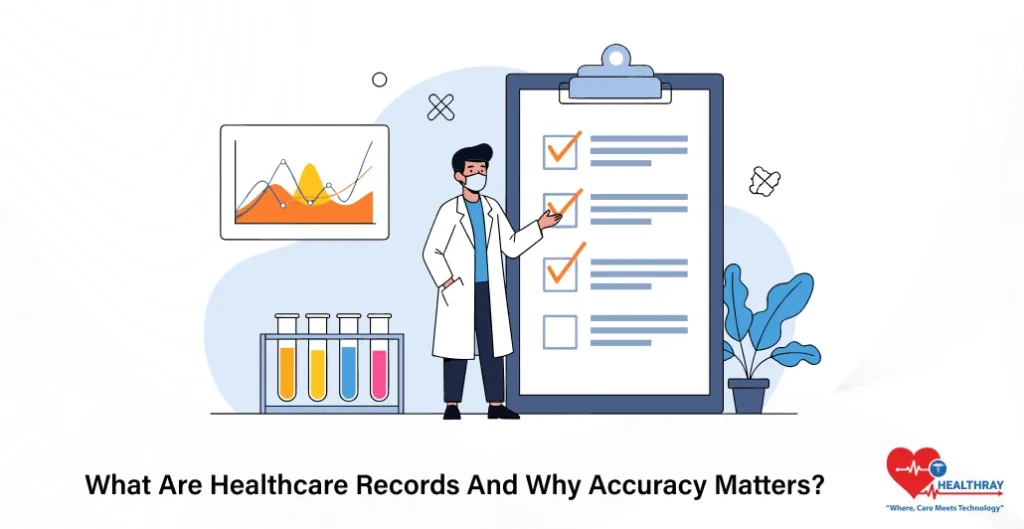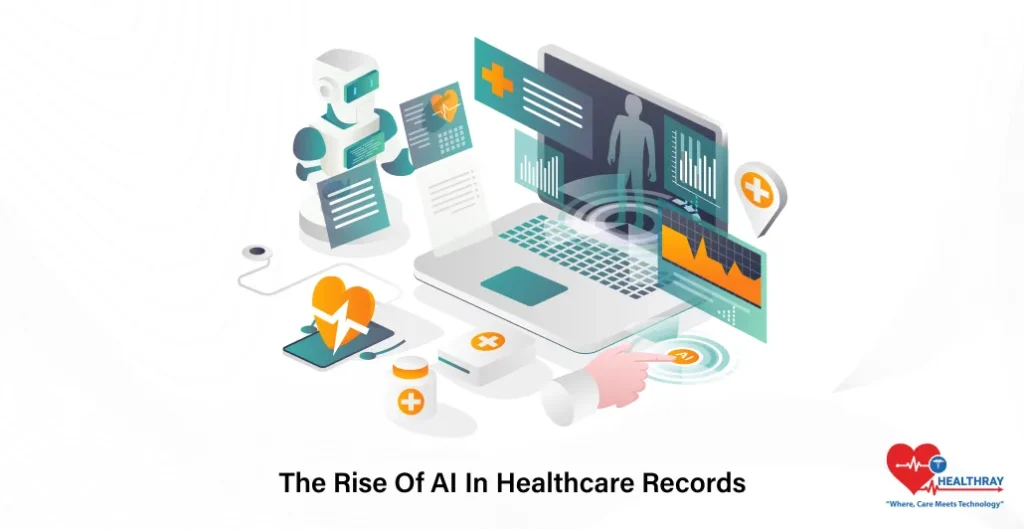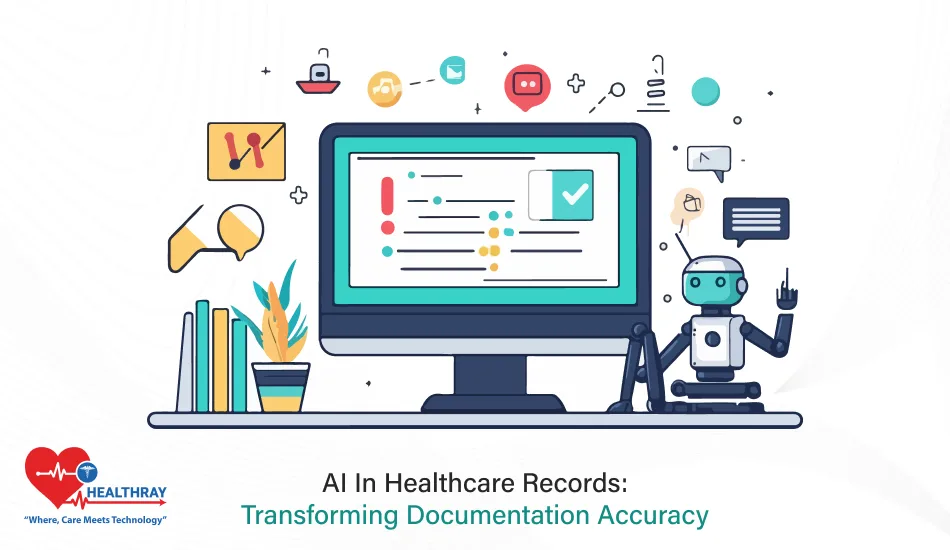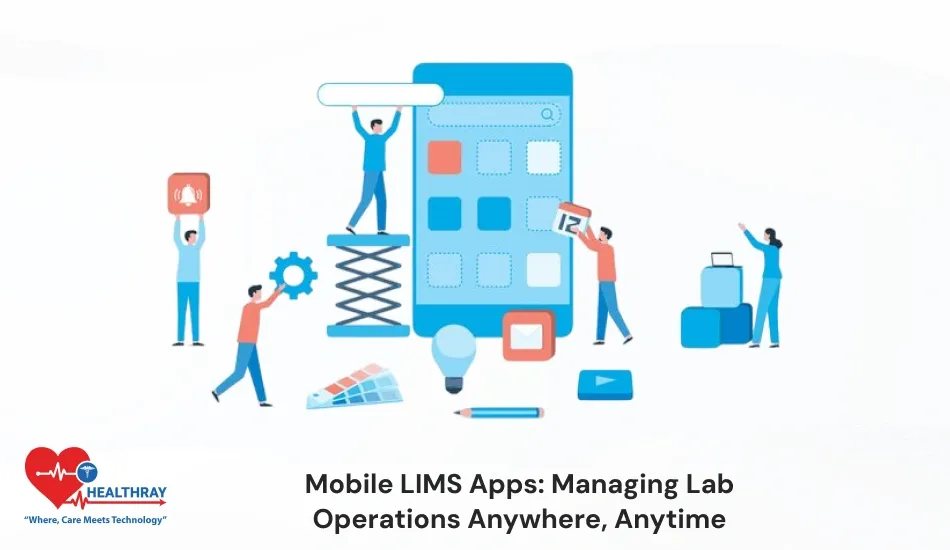Summary
Hospitals were a jungle of paperwork, lost files, and endless typing. But times indeed have changed! AI in Healthcare Records is a perky, fast, never-tired digital assistant.
It listens, it writes, and it fixes mistakes before anyone notices. The hospital management software now gives healthcare professionals a sense of finally feeling faster, cleaner, calmer. The result? Finer accuracy, better collaboration and patients receiving care as good as their records.
Introduction
Wouldn’t it be nice if doctors didn’t have to type and could spend more time with patients? Well, AI in Healthcare Records just made that a dream real!
Suppose that test results didn’t go missing and paperwork didn’t pile to the ceiling on your desk. Instead, you’ve got a smart digital sidekick who listens, writes and remembers everything flawlessly. It’s fast, it’s sharp, and it doesn’t even need coffee!
Doctors talk, A.I. types, and patients get better care faster. A neat trick, huh? But it’s pure tech savviness.
With AI in Healthcare Records, hospitals are becoming not jungles of paper but actually sensible data-savvy places. In this blog post, we will cover how this technology is increasing accuracy, saving time, and transforming how the heart of healthcare beats.
What Are Healthcare Records and Why Accuracy Matters?

Medical records are the living narrative of each patient. They include medical history, diagnoses, treatments, test results and notes from doctors, all of the details that help doctors make the right decisions. When these records remain accurate patients receive better, faster and safer care. But when they’re messy or incomplete, things can go extremely wrong. Missing allergy information or incorrect medication orders can be highly dangerous.
Traditional record-keeping does not hold up well to this strain. Physical files are misfiled, handwriting is illegible, and data entry mistakes are almost impossible to catch. In fact, digital systems are also vulnerable to overload and mismanagement. That’s why there is not just importance in accuracy, but everything.
This is where AI in healthcare records comes to the rescue. It tracks, corrects and organizes data better than humans can. Coupled with intelligent hospital management software, it allows healthcare providers to receive lucid, error-free information on demand. The result? Quicker care, more accurate care and happier, healthier patients.
The Old Problem: Manual Records and Endless Errors
Let’s go back a few years.
Imagine a bustling hospital on a Monday morning. The waiting rooms are full, the phones are ringing, and the staff are rushing between departments. Doctors thumb through patients’ files, nurses hunt for reports that have gone missing, and administrators puzzle over scribbled notes.
It was the old world of medical recordkeeping, a world that seemed orderly but was roiling with errors. The record-keeping at hospitals was a difficult course. Each patient visit meant more forms, reports, notes. Each department captured data in a different style and none were exact. Doctors completed forms by hand; nurses updated charts; clerks input data into computers. But with so many steps, mistakes were nigh on impossible to avoid. When healthcare providers handle hundreds of patients daily, even a small slip can turn serious.
Paper Records: A Maze of Errors
To be clear: paper records had some charm, but they were hellishly hard to manage. Dusty cabinets overflowed with stacks of files; each search was a scavenger hunt. If a file went missing, the department froze until it was found. Writing by hand only compounded the problem. Doctors scrawled between patients, their notes resembling secret codes. Nurses and pharmacists had to guess what it said and guessing is never safe in medicine. Over time, healthcare providers realized this wasn’t sustainable.
Paper, of course, faded, ripped, or just vanished, over time. During emergencies, hunting down patient histories became a game of time. Decisions of life and death could be affected by minutes. So, hospitals needed a better way, a system that didn’t rely on paper, memory or luck. That’s when modern hospital management software began to appear, hinting at a digital future.
Human Fatigue: The Hidden Enemy
Hospitals Never Sleep. Doctors and nurses work long hours and often under tremendous pressure. When people get tired, focus wanes, and accuracy in typing suffers. Working nights, fatigued shifts, and too much paperwork don’t allow for perfection. And it’s not that doctors and nurses aren’t skilled or trying their best. They’re just human.
Their priority is caring for patients, not entering data. But their systems were antiquated, making them fill out forms for hours when they should have been healing people. Over time, this drained their energy, affected morale and increased burnout.
Communication Gaps and Delays in Updates
In the old system, records were not updated in real time. A nurse might note the patient’s new ailment on paper, but it would take hours for the doctor to find out. Once in a while, an update dropped off in transit or was mistyped later.
The record was outdated before it had been made ‘complete’. It created confusion within teams because of the lag in communication. One department thought a patient was stable, another was preparing for an emergency. These mixups were common; they were a daily hospital life. This is where AI in Healthcare Records and hospital workflow automation software started changing the game.
The Need for a Smarter System
Hospitals needed to get smarter about this. They needed help – something faster, sharper and more reliable than manual data handling. That’s when AI in Healthcare became the industry’s new buzzword.
The Rise of AI in Healthcare Records

Not long ago, hospitals were filled with the sound of paper files and keyboards. Doctors scrambled to enter notes, nurses searched for lost reports, patients waited as data crawled through old systems. Then came a stealth revolution: AI in Healthcare Records. It didn’t shout or flash; it simply began to listen, learn and change the way healthcare told its stories.
In health care, by A.I. we mean much more than robots or fancy machines. It’s the smart brain behind your digital documents. Through the application of Natural Language Processing (NLP) and Machine Learning (ML), AI is able to comprehend medical language, identify important information, and organize it effectively. It learns from previous data and anticipates what a doctor might need next, much like a digital assistant anticipating your next thought. To build such intelligent systems, many organizations choose to hire AI programmers who can develop and refine these advanced capabilities.
Consider a physician dictating notes, while AI in real-time transcribes and formats speech into medical notes. Yeah, no typos. No missing data. Just some clean, accurate records to work with. Combine that with good hospital management software and all of a sudden record keeping becomes easy. Doctors spend less time typing and more time healing.
Globally, this turnaround is accelerating. AI in Healthcare Records is becoming more common at larger health networks and small clinics alike. Top hospitals in the U.S., Europe and Asia are teaching A.I. systems to read X-rays, monitor therapies and calculate the risk that a patient may develop a disease. This is the dawn of a new reality for healthcare professionals where technology augments, rather than replaces them. The rise of AI, which should be explained by intelligent people, not technologists, is not machines taking over, but humans and technology finally working in sync.
How AI in Healthcare Records Improves Documentation Accuracy?
Here’s how it works and why every hospital needs it.
Automated Data Entry – Say Goodbye to Manual Errors
Firstly, the boring task of data entry in the healthcare system is being automated by AI. It scans patient files, fills in fields and even cross-checks previous entries. It thus takes out duplication and human error that slows down work.
AI in Healthcare Records puts every note, date and number exactly where it belongs. And when integrated with hospital management software, this process can be made seamless across departments. Doctors can focus on care instead of typing lines of data, and accuracy goes up instantly.
Speech-to-Text Systems – Talk, Don’t Type
Think of a doctor speaking and AI hearing, comprehending and correctly transcribing every word. That’s the magic of modern AI in Healthcare speech systems. They understand medical terminology, can parse out background noise, and translate speech into crisp text.
So, say goodbye to late-night typing sprints and notes that went missing. This allows doctors to document every nuance while remaining fully present with patients. When integrated with hospital management software, the voice recordings are automatically filed into the appropriate files, which is a huge time-saving and productivity benefit.
Error Detection – Smarter Than Human Eyes
Even good doctors, when tired or rushed, make mistakes. But AI in Healthcare Records never tires. It scans, reads, and detects inconsistencies within seconds. It warns the user if a treatment is not appropriate for a diagnosis.
If any information is missing, it indicates that right away. This real-time error detection system serves as a second pair of superhuman eyes. Also, when used as part of hospital workflow automation software, it guarantees that each step of the data entry process has the highest possible accuracy.
Real-Time Validation – Accuracy on the Go
Mistakes in traditional record systems are discovered too late. But AI in Healthcare changes all that. It validates every input in real time. As soon as a nurse or doctor inputs information, it is checked by an AI for accuracy, formatting and context.
For example, if an incorrect dosage is entered, the system alerts the user immediately. Errors can be corrected more quickly, and more safely since the accuracy check is done live. This real-time validation ensures that everyone from receptionists to surgeons is synchronized.
Pattern Recognition – Smarter Learning Every Day
Here’s something more fascinating: AI in Healthcare Records keeps learning and getting smarter. When it processes new data, it looks for trends and patterns.
It could, for instance, detect patterns of repeated prescription errors or gaps in a patient’s history. Then it corrects so as not to make that mistake again. It moves automated rote procedures toward pattern-based intelligent problem solving. With time, accuracy improves and confidence in the system among the providers increases.
Step towards digital era with our healthcare solution
Revamp your hospital facilities and embrace change for better healthcare management. Ease in managing and organizing large medical datasets leads to effective analysis. Seize the opportunity now!
Predictive Documentation – Staying One Step Ahead
Why wait for mistakes when A.I. can prevent them? That’s where predictive documentation comes into play. AI in Healthcare deals with existing patient information, and predicts what the next logical piece of information should be.
For example, if a patient is diabetic, it may indicate fields of related lab tests or medications. This not only speeds up work but also ensures important information is not skipped over. It’s like having a little digital friend to tell you the next right thing to do. When combined with hospital workflow automation software, that kind of prediction makes keeping records nearly effortless.
Integration and Consistency Across Platforms
Systems vary from one hospital department to another. This is where things start to go wrong—data becomes fragmented or lost. But AI in Healthcare Records, when incorporated into hospital management software, can fill these gaps beautifully.
It maintains continuity of information between departments billing, pharmacy, diagnostics, etc. All the healthcare providers can see the updated record in real time, facilitating collaboration among them and expediting decision-making.
Conclusion
Those dusty files are disappearing, and clinical medicine is going digital. AI in Healthcare has turned confusion into clarity and errors into corrected, accurate data. AI in Healthcare, or hospital management software, or hospital workflow automation software, all working together, make hospitals think faster and care better.
Healthcare providers have finally found a partner that listens, learns and never forgets. The result? Smarter hospitals, safer patients, stress-free staff. The future of health care isn’t coming; it’s already here, rewriting every record with intelligence, precision and heart.




